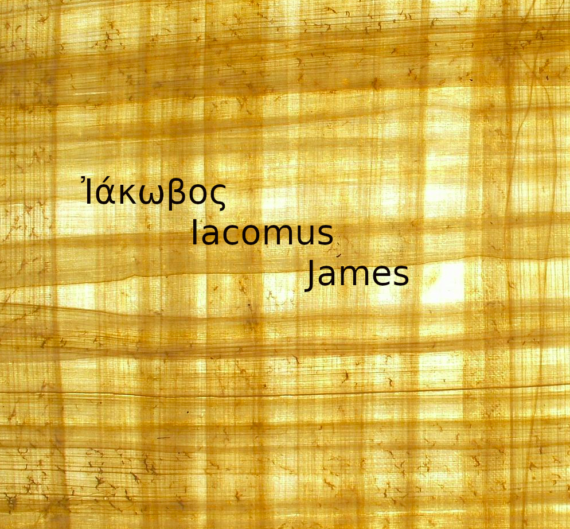How did the letter of Jacob come to be known as the letter of James when Jacob (Ἰάκωβος) is the author’s name in the Greek New Testament inspired by God? What are we missing by this change that occurred many centuries after God inspired him to write this powerful letter? What are some of the benefits of restoring title of his letter to Jacob, the name that God, Joseph and Mary gave Him?
How did the letter of Jacob come to be known as the letter of James?
In the AD 1200’s as English transitioned from Old to Middle English the Latin name for Jacob, Iacomus, came into common usage. John Wycliffe and his translation team brought Iacomus into the first complete English Bible as James in their first editions ca. AD 1382–1395. Wycliffe and his team ironically and unfortunately stayed with Jacob for the Patriarch son of Abraham thus unfortunately severing the obvious connection between all the New Testament Jacobs and their Israelite namesake. The name change stayed in subsequent English translations. The dominance of the Authorised (King James) Version (KJV) following its appearance in 1611 further ingrained this change.






What are we missing by this change from Jacob to James?
Jacob is a Hebrew Jewish name. James is primarily a Gentile name derivative of Hebrew via Latin, Old French and English, where the s is from the Old French masculine subject case.
Many times in Scripture God gives people names, and changes their names, because of the significance of the names to their recipients, their ancestors and others who will be named after them.
The name Jacob has many profound connections with the Jewish history of God’s people and His redeeming work through Israel and Jesus. To say Jacob was a Patriarch who had a huge impact on the history of Israel and God’s salvation of the world through Jesus is an understatement. Based on his arrival into the world as a second-born twin who grabbed-his brothers Esau’s heel and his birth-right and inheritance his inspired name means “one who grabs the heel,” “supplanter.” Based on Jacob’s perseverance and tenacious struggling for and desiring God’s blessing, God changed his name to Israel, “one who wrestles with God.”
Jacob is thus Patriarch and namesake of the nation of Israel through which Jesus Christ their Messiah and ours has come. Jacob’s journeys as a foreigner in Canaan and Egypt are emblematic of those in the dispersion to whom Jacob writes in the opening verse of his letter, “Jacob, a slave of God and the Lord Jesus Christ, to the twelve tribes in the dispersion” (1:1).
Jacob appears prominently in Jesus’ genealogy as Patriarch (Matthew 1:2; Luke 3:34), father of Joseph husband of Mary (Matthew 1:15–16), therefore, Jesus’ and his siblings’ grandfather including Jacob (James). Jacob is named after his grandfather and his ancestor the Patriarch namesake of Israel.
Jesus’ family recognized the tremendous significance of their ancestors. The importance of this lineage to Jewish believers and seekers is profound. It should be for all Gentile believers as well, because we are grafted into Israel by God’s grace
Jacob is prominent in Jesus’ teaching notably about: 1) His Father the God of Abraham, Isaac and Jacob, the God of the living (Matthew 23:32;Mark 12:26; Luke 20:37), 2) the resurrection of the dead (Luke 20:37), 3) the last days in which
nations come to recline at the table of Abraham, Isaac and Jacob (Matthew 8:11),
4) judgment (Luke 13:28), and 5) Jesus’ eternal reign: “He will reign over the house of Jacob forever, and His kingdom will have no end” (Luke 1:33).
We see it in the setting of Sychar in Samaria and metaphorical spiritual significance of Jacob’s well in Jesus’ exchange with the Samaritan woman (John 4:4–6, 12).
Jacob figures prominently in Stephen’s sermon on Jesus the Messiah of Israel
in Acts 7: 8, 12, 14–15, 32, 46.
Jacob is important in Paul’s writings in God’s choosing and sanctification of Jacob
(Romans 9:13; 11:26).
The name of Jacob is important to the Hebrews writer as an heir of God’s promises and blessing and in turn the blessing of His sons (Hebrews 11:9, 20–21).
Very importantly, Jacob’s letter has very strong links to the teaching of his brother Jesus, vivid illustrations similar to Jesus’ strong teachings and the eternal wisdom teachings of the First Covenant Scriptures (Old Testament).
What are the benefits of restoring Jacob’s God-inspired name?
We would have a clear understanding of Jacob’s relation to Jesus and their grandfather and long ancestral lineage. Jacob’s name would thus connect his readers with the Jewish history of God’s people and His redeeming work through Israel and Jesus.
His diaspora readers would clearly have identified with his name which was one of the most popular in their culture within the wider ancient world. Jacob’s letter has strong similarities with the diaspora letter of Jeremiah 29:1–23 on how a minority of believers is to live within a larger pagan world like the Roman Empire (with many parallels to the morality of our time).
It would clarify the language and possibly help solve important archaeological discoveries and debates such as the “James Ossuary.” Scholars and the public would recognize Jesus’ brother was actually Jacob (יַעֲקֹ֑ב Ya’akov) as on the ossuary inscription.
Appreciation for the powerful literary character of Jacob’s letter would be restored, clearly and effectively in our time. His references and allusions to Torah and Wisdom Literature of the Hebrew Bible and the teachings of Jesus would take on deeper meaning. Jacob is considered by some to be the most “Jewish” New Testament book.
Restoring Jacob’s Jewish name would immediately connect his readers with the broadest possible understandings of his perspectives on Jesus’ and Israelite wisdom and the comprehensive nature of his message for all believers, Jew and Gentile, for all time.
Waterloo, Ontario

